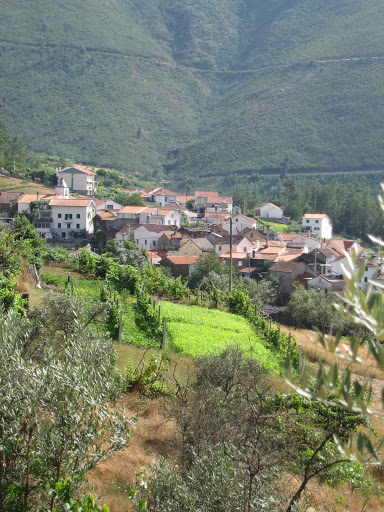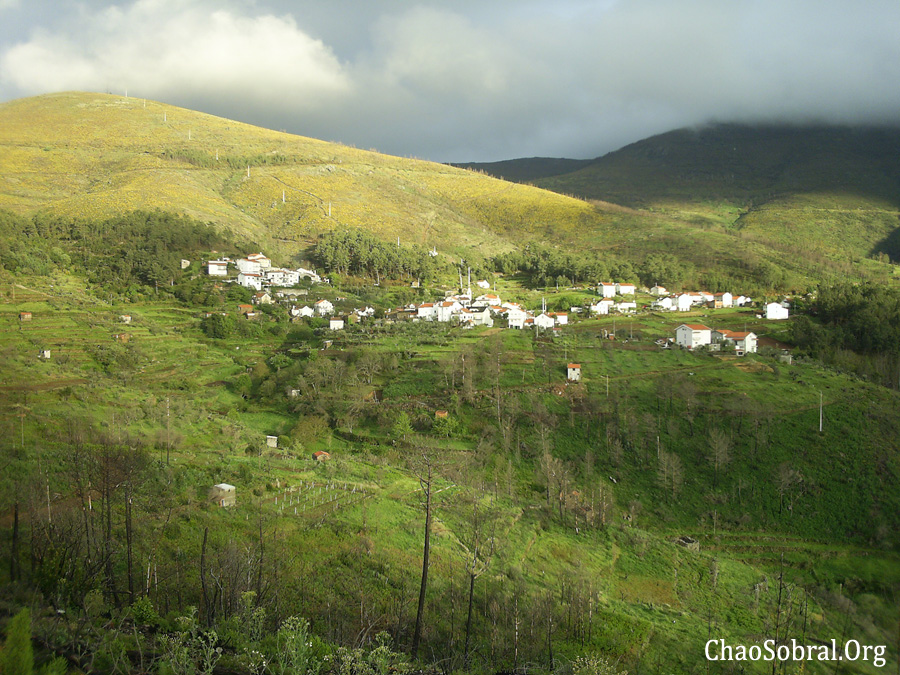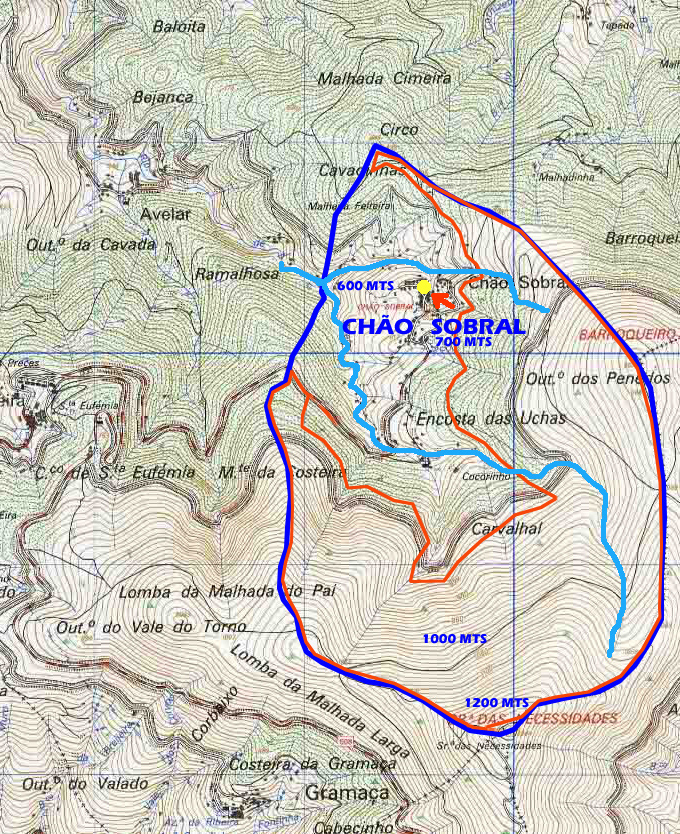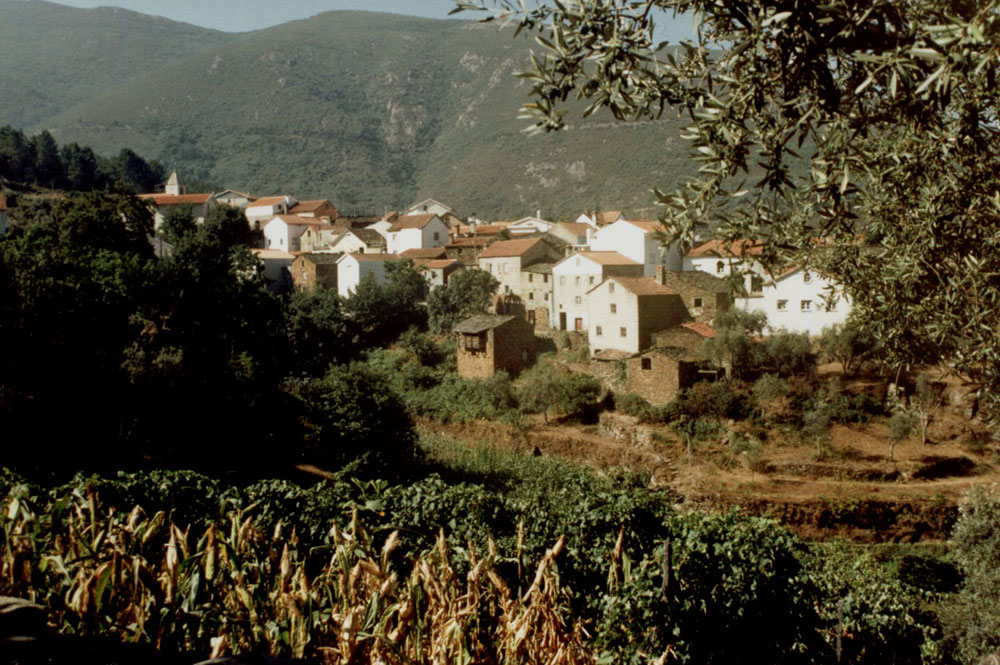


|
Commenced:
|
01/07/2012 |
|---|---|
|
Submitted:
|
09/08/2012 |
|
Last updated:
|
15/01/2018 |
|
Location:
|
Chão Sobral, Aldeia das Dez - OHP - Coimbra, PT |
|
Climate zone:
|
Warm Temperate |
This project context: - Indigenous/traditional/native hamlet community; - Whole families (about 100 people total, about 27 couples, 9 widowed elders); - On-going, for more than 500 hundred years; - Family and community reliance & organic cooperation; - Mountain based livelihood dynamics, strategies, impact, and resilience; - Agriculture, forestry, cultural, recreational and social initiatives; - Based on steep, rocky (Xist) and ridge mountain slopes ecosystems; - In between 400 and 1200 meters altitude; - Most mountain area (zones 4 and 5) suffered and is recovering from September of 1987 and July of 2005 dry season big fires; - In central (green heart of) Portugal, Goshawk mountains range, south-west Europe.

This "permanent steep rocky ridge mountain culture" project was founded + 500 years ago by our community ancestors, probably 1 family or clan of goat shepperds and chestnut lovers (Castanea sativa).
Our land is located on ridge steep mountain convex slopes in the Goshawk Mountain range in central Portugal. Zones 1, 2, 3 and 4 mostly facing West, Southwest and South. Zone 5 faces North, North-east and West.
The name of our hamlet-land "Chão Sobral" means: "chão"/"ground", "sobral"/"cork tree grove" = "The Ground of the Cork Trees". Strangely today there are no cork trees, Quercus suber, around! ... Maybe there's another, more accurate, explanation for the name of the hamlet...
The ongoing mountain living project was started by hamlets people who were at the same time peasants, hunters and goat shepperds, ox tamers and builders, that used to build their homes with dry stone (xist) and wood only (mostly chestnut) .
CLIMATE
Warm temperate to mediterranean. Wet and cool to cold season usually from October to April (in our grandparents days snow used to stay for weeks). Warm season from May until September. Wet and Dry seasons length is variable, and can last for 5 to 7 months.
WATER
Two main seasonal creeks run down the 2 main steep valleys.
The rains absorbed by the wild vegetation on the north and west facing slopes feed the mountain watertables that feed springs that usually spring water year around, but that decreases noticeably by the end of the Dry season.
This means that water only runs chrystal clear a few months after the rainy season.Then creeks run dry because creek bed springs water is captured in tiny dams and used for irrigating terraces (vegetables and staple foods) according to old tradition of sharing water.
Through the dry season we rely on spring water from the many small springs scattered on creek beds in valleys and on secondary ridges, most of them above 500 mts altitude. All water arrives in plastic pipes to the hamlet by gravity.
In the last 20-30 years many families got water boreholes, and use this water at home and to irrigate their vegetable gardens increasing yields during the dry season.
CHANGE
From centuries old local regenerative, resilient and sustainable mountain livelihoods we have become more interdependent in the global planetary village as dirt roads became available in the last 60 years.
Compared to 500 years ago, nowadays our skills, beliefs and resources are more diverse, probably...
Despite the change of culture, migrations and depopulation along the industrial and digital revolution, official schooling courses, we maintain and practice, in our daily life, old and innovative strategies that are key for a resilient, abundant and regenerative mountain "edge/marginal/extreme" resource finite eco-culture.
We still harvest shrubs-biomass daily from the mountain, carried on our backs through walking trails only, to regenerate the soil, to build fertile terraced growing beds.
This project is about blending "permaculture research and design" with local traditions and centuries old resilient "stuborn" mountain livelihood research to meet the needs of present and future living beings and ecosystem communities.
The steepness of our land, and the way we synergize with it, is life changing and life giving ...
Thank you to our "extreme permaculture" pioneers forefathers, who started this "brave and crazy project" hundreds of years ago, as they came to live self-reliant lives where no one else dared and had to, before them!
Below: Looking towards South-east - Chão Sobral and its watershed.

Below: contour lines map (the contours are spaced at 10 metre altitude intervals) with blue line marking the border of the Chao Sobral water shed. Red line marks the border of the "Commons Land" - community owned property. Light blue line marks the 2 main creek beds. Land inside the blue line is owned by hamlet people. Some of the land outside and bordering with the blue line (outside the watershed) is also owned by hamlet people.

Below: Looking towards the East - The Serra da Estrela Mountain range. The slope we see faces west. Water springs and zones are identified.

Below: Looking towards south-west, most of the hamlet houses stand on a rocky ridge crest.

Below: July 2005 - Chão Sobral and its water shed, after the big fire, that started in another mountain hamlet and lasted for a few days - more photos at http://chaosobral.org/incendio.htm
http://florestaparasempre.no.sapo.pt/ineng.htm

Note: The various badges displayed in people profiles are largely honesty-based self-proclamations by the individuals themselves. There are reporting functions users can use if they know of blatant misrepresentation (for both people and projects). Legitimacy, competency and reputation for all people and projects can be evidenced and/or developed through their providing regular updates on permaculture work they’re involved in, before/after photographs, etc. A spirit of objective nurturing of both people and projects through knowledge/encouragement/inspiration/resource sharing is the aim of the Worldwide Permaculture Network.
 |
MemberA member is a permaculturist who has never taken a PDC course. These cannot become PDC teachers. Members may be novice or highly experienced permaculturists or anywhere in between. Watch their updates for evaluation. |
|---|---|
  |
Permaculture MatchmakerOne of these badges will show if you select your gender and the "I'm single, looking for a permaculture partner" option in your profile. |
 |
PDCPeople who claim to have taken a Permaculture Design Certificate (PDC) course somewhere in the world. |
 |
PDC VerifiedPeople who have entered an email address for the teacher of their PDC course, and have had their PDC status verified by that teacher. Watch their updates for evaluation. |
 |
PRI PDCPeople who’ve taken a Permaculture Research Institute PDC somewhere in the world. |
 |
PDC TeacherPeople who claim to teach some version of PDC somewhere in the world. |
 |
PRI TeacherWith the exception of the ‘Member’ who has never taken a PDC, all of the above can apply to become a PRI PDC Teacher. PRI PDC Teachers are those who the PRI recognise, through a vetting board, as determined and competent to teach the full 72-hour course as developed by Permaculture founder Bill Mollison – covering all the topics of The Designers’ Manual as well as possible (i.e. not cherry picking only aspects the teacher feels most interested or competent in). Such teachers also commit to focussing on the design science, and not including subjective spiritual/metaphysical elements. The reason these items are not included in the PDC curriculum is because they are “belief” based. Permaculture Design education concerns itself with teaching good design based on strategies and techniques which are scientifically provable. PRI PDC Teachers may be given teaching and/or consultancy offerings as they become available as the network grows. |
 |
Aid WorkerThe individual with this badge is indicating they are, have, or would like to be involved in permaculture aid work. As such, the individual may or may not have permaculture aid worker experience. Watch their updates for evaluation. |
 |
ConsultantThe individual with this badge is indicating they are, have, or would like to do paid permaculture design consultancy work. As such, the individual may or may not have permaculture consultancy experience. Watch their updates for evaluation. |
 |
Community ProjectCommunity projects are projects that help develop sustainable community interaction and increase localised resiliency. |
steepness by google earth
Fruit of avocado tree planted in Spring 2013
agroecology, foodforest and avocado trees in Portugal workshop
workshop that provides the basic design tools to create a garden of eden, starting with avocado ...
Introduction to Permaculture Course in Chão Sobral
With Chao Sobral village in the backgound we are going to provide the basic concept tools to create a regenerative design.
Casuarina cones - the first seed harvest
Casuarina are multifunctional trees and we are creating a local/Chão Sobral Casuarina seed bank.
hand cut shrubs for animal bedding composting
collecting woody species like Ericas, Cytisus and Genista, a almost daily task, physical and contemplative practice, part of the proccess that builds soil on the rocky slopes and reduces fuel for fires
Zone 4 resources: #1The pine tree forest, pine tree needles
Pine tree needles (Pinus pinaster) are often used, in Chão Sobral, to mulch the soil in between potatoe plants.
sub-tropical green house laboratory - in "Cherry Tree Country"
the early stages of a perenial edible landscape within the green-house microclimate - creating the conditions for the pleasure of co-creation and learning from nature evolutions
Mountain wild herbs for sale on-line
local wild plants are available for medicinal purposes and to shop on-line
1st Cycle of Meetings "Edible landscapes - Food forests and Agro-forestry in Fire-prone Landscape" in Chão Sobral
"Because we live in a gunpowder barrel ... " and we need to test practices, enacting knowledge and understand the different ways to deal with our ecosystem, reducing the destructive fire hazard and generating economy, ecological services and health.
Casuarina trees experiment on the ridge crest
For this Casuarina experiment a ridge crest (at about 600 mts high) with good sunlight and WIND exposure was chosen.
Enjoy the magnificent
Enjoy the magnificent - The YellowBroom Mountain-Scape 180º Panorama Photos - Sprintime colors like we have never see them. Plus photos of tilled and seeded terraces.
"On the Edge Permaculture"
Introduction to strategies developed through centuries that, and in the present, work towards the permanent culture at Chão Sobral, and on the rocky and steep areas of the Goshawk Mountain range.
Grafting - Obtain a yield and Increase diversity with perenial tree crops
To increase the diversity of fruits. Cherries, plums, apples and pears are well adapted. Once the neighbor has one new variety, it is shared and it's easy to propagate using different grafting techniques.
Water channels under renovation
after a few centuries of use and minimum maintenance, the traditional community managed summer irrigation water channels undergo renovation to achieve higher efficiency
dry stone stacking builders
Two friends reparing the terrace retaining wall, that had collapsed a few months before.
On rock cropping - "Garden on the moon"
Everyday we are more and more people on the planet. The planet though is not getting any bigger. Here on the rocky and steep mountain side, the agriculture surface area is being created for the last + 500 years. Here we see some results.
Sounds, Skills and Savours Festival - Photos
This initiative took place in the context of the Program Youth Solidarity - With the Support from the Oliveira do Hospital Council. Some photos to remember this beautiful day! The 29th of September 2012.
Strawberry-tree - from flower to firewater
Another king of the mountain - Arbutus unedo - a great multi-functional tree in our rocky steep slopes: from its berries is distilled the medicinal alcohol, berries are great autumn meal for wildbirds, its wood keeps us warm throught the winter, and it's
after potatoe picking - earthworks for cabbage seedlings
we are in the mid of dry season, potoates were harvested. in the same soil cabbage will follow and get the kickstart of end summer heat and grow and thrive through the frosty wet season
3 generations picking potatoes - recalling last summer holidays
for hundreds of years grandparents, parents and children would live together and there was no separation between work and play time!
To create soil - biomass harvest, animal bedding, underground composting
In these rocky slopes facing south and west top soil is thin over the bedrock and carbon cycles fast. Intensive soil generation strategy was developed.
water - the treasure, terraces, tunnels and stream bed diversion
pictures showing hand built structures, more than 100 years ago, earth works and stacked dry stone, still in use and if maintained to last for 1000's of years
Goats + their Photo Album
Our culture would cease to exist if we would stop caring for goats. They are friendly companions in our Cosmic trip, even though they are stubborn and selfish, they are pretty and loved!
October Fruit Harvest - Tree Crops
fruits for every meal
Terraces on convex rocky ridge slopes
there's no where else to go ... there's lots of xist rocks and not much soil. crystal clear water springs from the xist rocky slope - the reason why we are here, after all ...
Festival Sons, Saberes e Sabores - Sounds, Skills and Flavours Festival
This event is going to take place on the 28&29 September in Chao Sobral - mountain hamlet - Oliveira do Hospital municipality - central Portugal. Sounds, films, concert, workshops, farmer´s market, local food.
The food forest on the ridge crest
This plot is located on the ridge crest, next to the old track and water channel. Te area is called "Linhar" meaning linen field. It is now becoming a forest of food and a place to rest during the hot summer afternoon.
Steep slope, terraces, soil, tilling, manure, many hands
The earthworks, composting, fertilization and gardening strategies for this ecosystem conditions